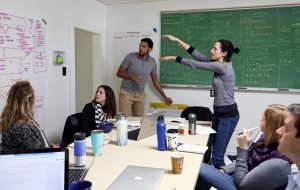Dear Virginia Sea Grant Community,
I hope that you, your family and friends are safe, healthy and coping well during these uncertain times. The coronavirus outbreak has undoubtedly changed your plans, whether for research, travel, or other professional opportunities. Virginia Sea Grant staff members have also been adjusting to working from home, managing care for their children and parents, and curtailing their professional engagements. We are all practicing fluid, flexible thinking in response to the rapidly changing situation – that same idea that we advance in the professional development training for our fellows, that we need to learn how to be comfortable being uncomfortable.
While the coronavirus has required changes to the way we conduct our daily activities, adapting to this challenge provides us with the opportunity to call on the professional skills we aim to cultivate and practice within Virginia Sea Grant’s network. What might this mean for you; how can I practice fluid, flexible approaches and be comfortable even when I’m outside my comfort zone? The other day, I had five and a half hours of virtual meetings on five different online meeting platforms. Participants tripped up searching for mute buttons, adjusting microphone and camera settings, and finding a conversational rhythm that didn’t speak over others. The successful meeting participants found ways to not sweat the small stuff, stay focused on priorities, and help the group avoid getting derailed by the new and unexpected inconveniences. Finding light topics and humor helped—comments on someone’s unique home office décor or creating a wall of hoarded toilet paper and paper towels in your camera view. Providing predictability helps people to cope. For example, the UPS driver typically goes by my house in about 15 minutes and my dog is going to go crazy. While unprecedented in our lifetimes, this pandemic will end and “normalcy” will return, although this experience will likely change our professional lives forever.
I extend the same challenge to you as I have to our Virginia Sea Grant fellows: As we take time to care for our loved ones and adjust to new—albeit temporary—routines, we can also use this time to reflect and strengthen the invaluable skills that will prepare us for future challenges. If you can manage life under COVID-19, that next challenge will be easy.
Virginia Sea Grant looks forward to supporting you in your work and identifying new ways to strengthen coastal communities and marine resources. Many of our collaborators, partners, clients, and friends are not as fortunate as we are—their jobs won’t let them telecommute and their small businesses depend upon social contact. Reach out online or over the phone to your current and past collaborators and check-in to make sure they are okay. Nothing builds a stronger network than being genuine, and now is a time to be friends and colleagues first.
Virginia Sea Grant’s External Advisory Committee and Research and Education Advisory Committee will convene virtually as necessary to address critical issues and guide the strategic direction of Virginia Sea Grant. But we also recognize that each of our REAC and EAC members are likely dealing with the effects of COVID-19 within their own professional networks, whether those are shellfish hatcheries about to launch into a busy time in their operations, seafood chefs dealing with restaurant closures, researchers about to launch fieldwork, teachers adapting to online classrooms, or one of the many other industries affected by the current uncertainty. Virginia Sea Grant stands ready to be flexible and to work with you to ensure your success, because we invest in people. You, and your future, are what we care about, and helping you cope with today’s temporary obstacle will pay back many times over in the future.
Our fellowship and research programs will continue to move forward. For our current fellows, professional development coordinator Michelle Rodriguez will assist in adjusting plans and identifying opportunities that can be completed remotely. Our communications team will also continue to share the important work you do to strengthen Virginia’s coastal resources and the stakeholders who depend on them. Scott Sandridge and our program staff will help make no-cost extensions, re-budgets, and work plan adjustments happen.
Virginia Sea Grant welcomes your thoughts, concerns, and your stories as you navigate this unexpected experience. There will be some bright and surprising moments if we practice fluid, flexible thinking to grow comfortable in the face of uncertainty. If we adapt now, we will emerge with strong connections and a flexible outlook—equipped to tackle future challenges.
Be safe and I look forward to seeing you soon.
Troy Hartley
Director



